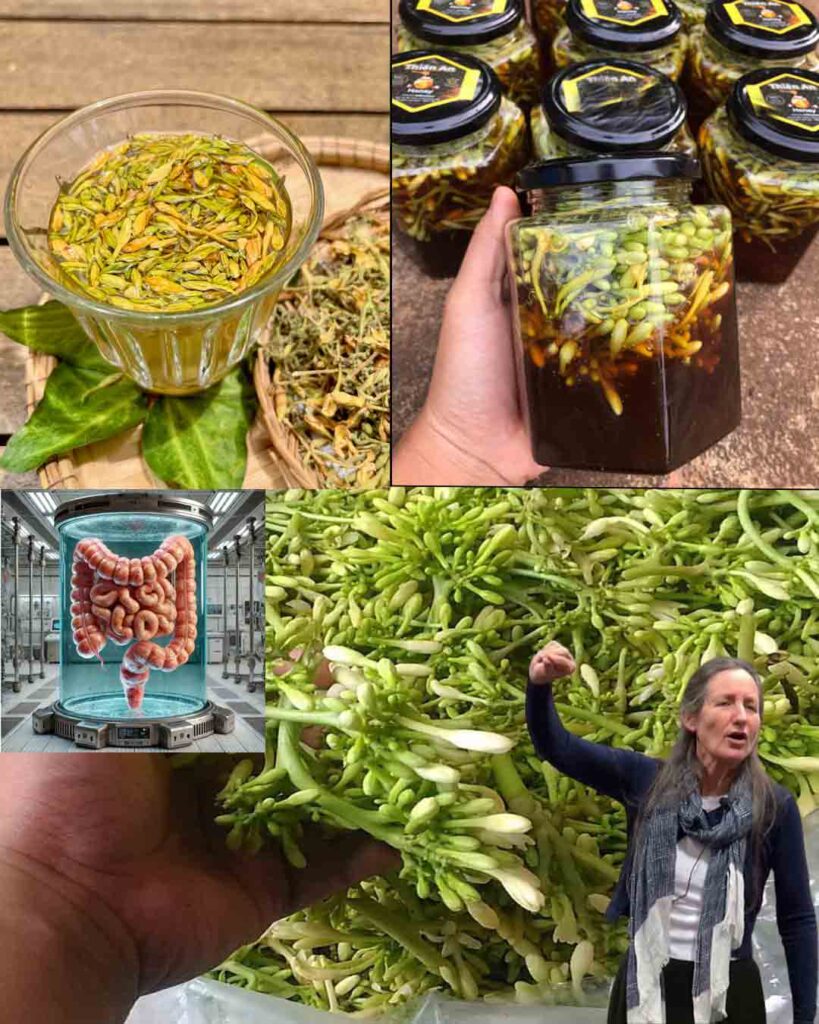Papaya flowers, often overshadowed by the nutrient-rich papaya fruit, are a hidden gem in traditional medicine. These small, bitter flowers are packed with antioxidants, digestive enzymes, and medicinal properties, making them a powerful natural remedy for various health conditions.

When combined with raw organic honey, their healing potential is enhanced, creating a delicious and effective home remedy. Whether you’re looking to boost immunity, improve digestion, regulate blood sugar levels, or support respiratory health, papaya flowers soaked in honey offer a natural, holistic approach to wellness.
Health Benefits of Papaya Flowers Soaked in Honey
Supports Respiratory Health
Papaya flowers and honey work together to soothe the throat, reduce congestion, and promote lung health.
- Relieves coughs and colds: This combination acts as a natural expectorant, helping to clear mucus, ease congestion, and soothe irritated airways.
- Treats sore throat: Honey’s antimicrobial and anti-inflammatory properties help reduce throat irritation and bacterial infections.
How to Use: Take one teaspoon when experiencing a sore throat, cough, or respiratory discomfort.
Improves Digestive Health
Papaya flowers are a natural digestive aid, thanks to their enzyme-rich content.
- Boosts digestive enzymes: These flowers contain papain, a powerful enzyme that breaks down proteins, promoting better digestion.
- Reduces bloating and indigestion: Regular consumption can soothe the digestive tract, reduce gas, bloating, and acidity, and improve gut health.
How to Use: Take one to two teaspoons after meals to aid digestion and prevent bloating.
Regulates Blood Sugar Levels
Papaya flowers have been traditionally used in herbal medicine to help balance blood sugar levels and improve insulin sensitivity.
- Natural blood sugar regulator: The bioactive compounds in papaya flowers help reduce glucose spikes and enhance insulin function.
- Honey’s role: While honey contains natural sugars, its low glycemic index makes it a better alternative to refined sugar when consumed in moderation.
How to Use: Take half to one teaspoon daily, especially for individuals managing diabetes or prediabetes (consult a healthcare provider first).
Promotes Liver Health and Detoxification
Papaya flowers are known for their liver-detoxifying properties, making them beneficial for liver function and overall cleansing.
- Supports liver detoxification: These flowers help the liver eliminate toxins and improve metabolic functions.
- Reduces fatty liver risk: Regular consumption may prevent fat accumulation in the liver, reducing the risk of fatty liver disease.
How to Use: Take one teaspoon daily as part of a liver-friendly diet.
Boosts Immune System Function
A strong immune system is essential for fighting infections and maintaining overall health.
- Rich in antioxidants and vitamin C: Papaya flowers help neutralize free radicals, reducing oxidative stress and inflammation.
- Honey’s antimicrobial properties: Honey adds extra immunity-boosting effects, protecting against bacterial and viral infections.
How to Use: Take a spoonful daily, especially during cold and flu season.
Reduces Inflammation and Supports Joint Health
Chronic inflammation is linked to various health conditions, including arthritis, heart disease, and digestive disorders.
- Anti-inflammatory effects: The bioactive compounds in papaya flowers help reduce pain and swelling in the body.
- Relieves joint pain: This remedy may help alleviate arthritis symptoms and improve mobility.
How to Use: Take one teaspoon daily to support anti-inflammatory benefits.
Enhances Skin Health and Natural Glow
Papaya flowers and honey nourish the skin from within, promoting a healthy, radiant complexion.
- Promotes skin glow: Antioxidants help combat dullness, dark spots, and signs of aging.
- Treats acne and blemishes: Honey’s antibacterial properties work alongside papaya flowers to reduce acne and skin inflammation.
How to Use: Consume daily or use as a natural face mask for glowing skin.
How to Prepare Papaya Flowers Soaked in Honey
Ingredients
- Fresh or dried papaya flowers
- Raw, organic honey
Instructions
- Wash the papaya flowers thoroughly and pat them dry.
- Place the flowers in a clean, sterilized glass jar.
- Pour raw honey over the flowers until they are fully submerged.
- Seal the jar and let it sit for seven to ten days to allow the honey to infuse with the beneficial properties of the flowers.
- Store in a cool, dark place for longer shelf life.
How to Use Papaya Flowers in Honey for Maximum Benefits
- Daily wellness booster: Take one to two teaspoons daily for immune support and overall health.
- Cough and cold remedy: Consume a spoonful when experiencing cold symptoms.
- Digestive aid: Take after meals to promote digestion and reduce bloating.
- Tea additive: Add one teaspoon to warm water or tea for extra flavor and health benefits.
- Natural face mask: Mix with yogurt or turmeric and apply as a skin-brightening face mask.
Precautions and Safety Considerations
- Check for allergies: Avoid if you’re allergic to papaya, honey, or pollen-based products.
- Moderation for diabetics: While honey is a natural sweetener, it should be consumed in controlled amounts for individuals with diabetes.
- Pregnancy and papaya concerns: Pregnant women should consult a doctor before consuming papaya-based remedies, as certain compounds may not be suitable.
Final Thoughts: Why You Should Try Papaya Flowers Soaked in Honey
Papaya flowers soaked in honey create a simple yet powerful natural remedy with multiple health benefits. Whether you need immune support, better digestion, improved liver health, or relief from respiratory issues, this remedy is a valuable addition to any natural wellness routine.
By incorporating this time-tested remedy into your diet, you can experience better health, improved vitality, and enhanced well-being—all in one spoonful.
Have you tried papaya flowers soaked in honey? Share your experience in the comments.





